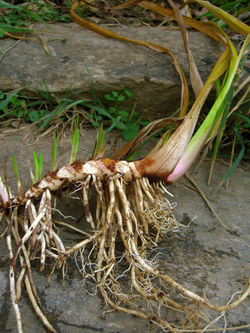Calamus
Other Names: Acore Odorant, Acore Olorant, Acore Roseau, Acorus americanus, Acorus calamus, Acorus gramineus, Acorus Roseau, Bach, Belle-Angélique, Cálamo, Cinnamon Sedge, Flagroot, Gladdon, Grass-Leaf Sweetflag, Grass Myrtle, Kalmus, Myrtle Flag, Myrtle Sedge, Sadgrantha, Sweet Calamus, Sweet Cane, Sweet Cinnamon, Sweet Flag, Sweet Grass, Sweet Myrtle, Sweet Root, Sweet Rush, Sweet Sedge, Ugragandha, Vach, Vacha, Vachha, Vaj, Vayambur, Kalmoes, Kalmoeswortel
Calamus is an aquatic, reed-like plant that grows to three feet in height. It has sword-shaped leaves that resembles those of irises and produces a solid cylindrical flower spike that is two to four inches long, that is covered with small, tightly packed, greenish-yellow flowers.It originated from Asia, Europe, and North American. It prefers muddy soil and grows in marshes, ditches, and along shallow, somewhat stagnant waterways. Plants that grow in the cool northern climates usually do not produce fruit. It is used in incense sticks and dhup and is widely used as insecticide for lice, bedbugs, and worms. Because of it sweet smell, the volatile oil that is extracted from the roots is still used in perfumery today. All parts of the Calamus herb emit an aromatic fragrance that has been described as cinnamon-spicy and also reminiscent of the aroma of tangerines that has been crushed. The ground root has been used in potpourris, sachets, and hair powders.
Special Precautions of Calamus
- Calamus is UNSAFE when taken by mouth. It can cause kidney damage, shaking, and seizures.
- The FDA prohibits calamus use in food products because three of the four species of calamus found in the world contain a cancer–causing chemical called beta-isoasarone. However, the beta-isoasarone content can vary widely among species from 0% to 96%. Some products may be safer than others.
- Pregnancy and breast-feeding: Calamus is UNSAFE when taken by mouth during pregnancy or breast-feeding. Avoid use.
- Certain studies and reports suggest that the asorone contained in Calamus oil can cause convulsions and hallucinations if taken internally (orally).
- Surgery: Calamus can affect the central nervous system. It might cause too much sleepiness if combined with medications used during and after surgery. If you are using calamus despite safety concerns, stop using it at least 2 weeks before a scheduled surgery.
- Medications for depression (MAOIs) interacts with CALAMUS
- Sedative medications (CNS depressants) interacts with CALAMUS
- Antacids interacts with CALAMUS
- Medications that decrease stomach acid (H2-Blockers) interacts with CALAMUS
- Medications that decrease stomach acid (Proton pump inhibitors) interacts with CALAMUS
The benefits of Calamus are
The therapeutic Properties for Calamus essential oil are antibiotic, antispasmodic, circulatory, cephalic, stimulant and nervine.
- Use internally for:
- stimulating the appetite
- relieving bloating
- relieving flatulence
- regulating stomach acid production
- calming digestion
- dispelling intestinal worms
- dyspeptic disorders
- gastritis
- ulcers
- sinusitis
- bronchitis
- asthma
- sinus headaches
- nervous disorders
- epilepsy
- Apply externally for:
- soothing aching muscles
- skin eruptions
- rheumatic pain
- neuralgia
- varicose veins
- Used in the bath for:
- fatigue
- nervous exhaustion
- Use as a mouth rinse for:
- gum disease
